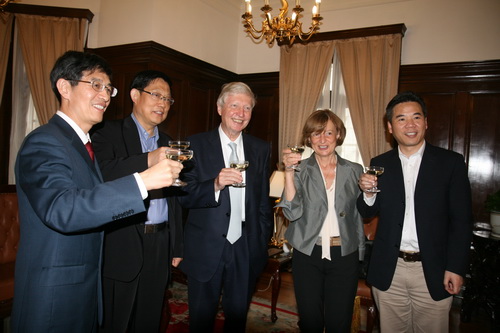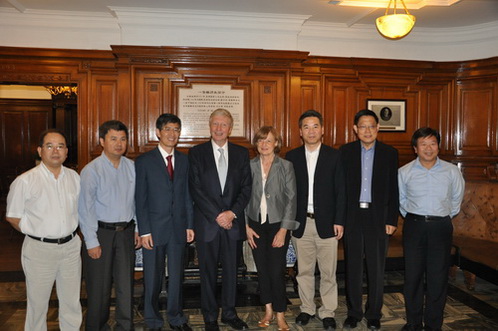Jules Hoffmann, one of the three scientists to share the 2011 Nobel Prize in medicine, visited Shanghai Institutes for Biological Science from October 2nd to 4th. On October 3rd, the scientist was on a visit to Shanghai when he was told of the Nobel Committee's decision.
Hosted by Chen Xiaoya, president of SIBS, a little champagne party was held in SIBS to express congratulations. Dr. Chen Xiaoya presented a bouquet of flowers to Hoffmann and delivered congratulations from Professor Bai Chunli, president of CAS.
Zhu Zhiyuan, executive vice president of Shanghai Branch, CAS said that the Chinese economy has developed rapidly in recent years. China’s life science programs have also enjoyed a substantial development. Shanghai now has the largest life science research base of Chinese Academy of Sciences. The award of Professor Hoffman will be a significant gain for Chinese life scientists.

“
“I am already impressed by the increase of research in quality and quantity in China," Prof. Jules Hoffmann said. "I see it as a positive trend.”
Hoffmann first visited China in 1980 to carry out insect research with scientists of CAS. Hoping for more collaboration with Chinese scientists and having a deep interest in Chinese culture, he promised he would return. He has since visited the city half a dozen times.
Jules A. Hoffmann is a research director and member of the board of administrators of the National Center of Scientific Research (CNRS) in Strasbourg, France. In 2007, he became President of the French Academy of Sciences.
Together with Bruce Beutler, he received the 2011 Nobel Prize in Physiology or Medicine for "discoveries concerning the activation of innate immunity." Hoffmann and Bruno Lemaitre discovered the function of the fruit fly Toll gene in innate immunity. Its mammalian homologs, the Toll-like receptors, were discovered by Beutler. Toll-like receptors identify constituents of other organisms like fungi and bacteria, and trigger an immune response, explaining e.g. how septic shock can be triggered by bacterial remains.


